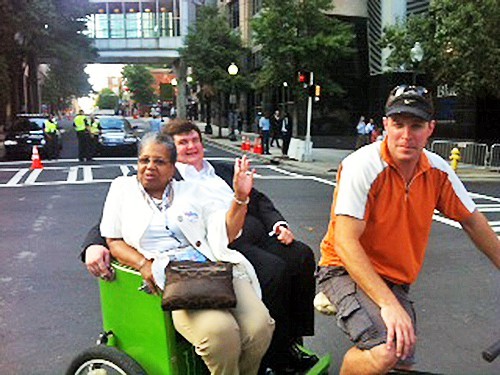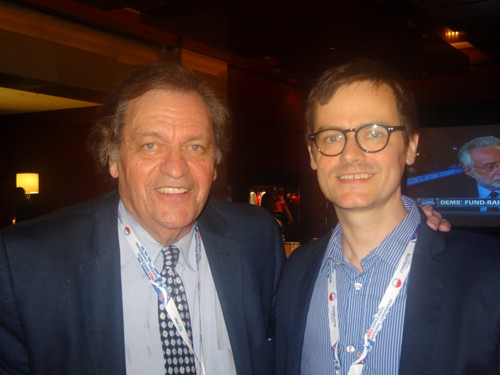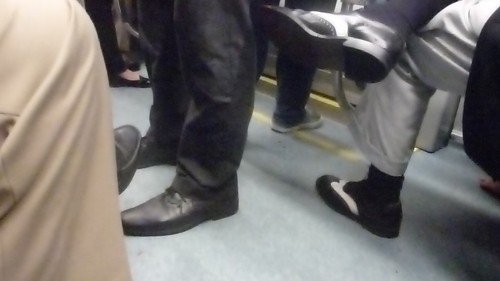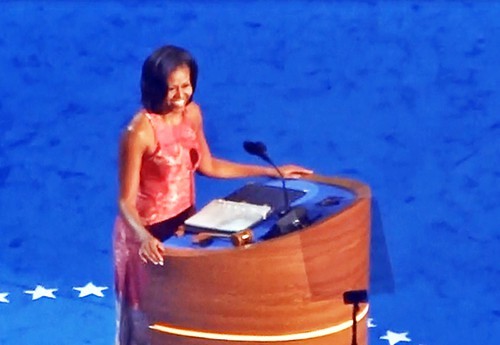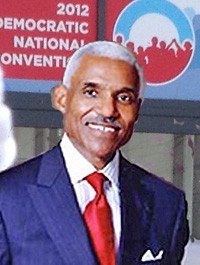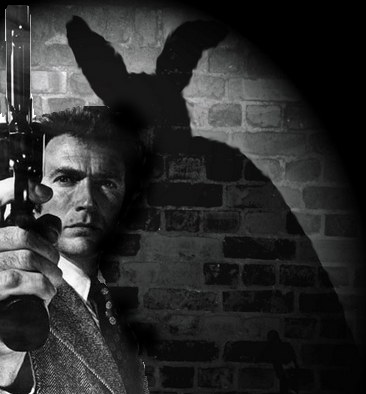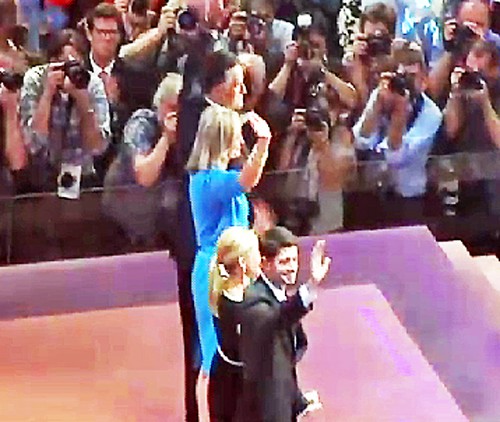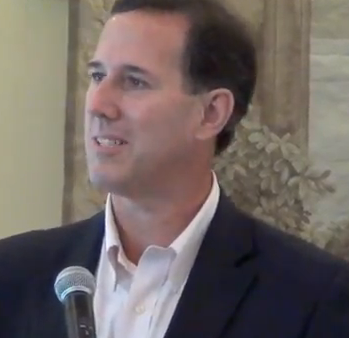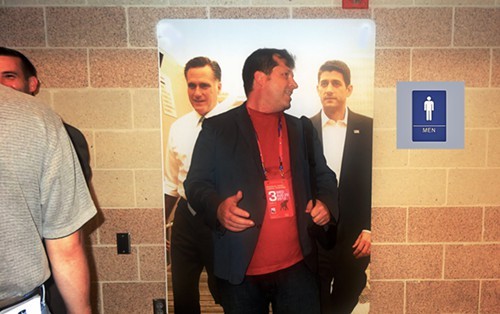It may not pass muster with the latest news in National Enquirer or Huffington Post of what (or whom) Kim Kardashian is doing, but we think this shot of Ruby Wharton, wife of Memphis Mayor A C Wharton and a civic force in her own right, sitting in the lap of Democratic activist John Freeman aboard a rickshaw in Charlotte, N.C., is pretty hot.
Freeman, who has been an aide to several Memphis political figures, including congressman Harold Ford Jr., and another Memphis guest at the Democratic Convention, political operative David Upton, tied in with Ford one day in Charlotte. Ford, who now lives and works on Wall Street and does regular commentary for MSNBC, met the Memphis duo for drinks at the Ritz-Carlton, located near the Time Warner Cable arena.
The former congressman, who did daily stints on the Morning Joe program, still has some magnetism with both media and political types, and the trio found themselves being joined by the likes of interview host Charlie Rose, Senator John Kerry, and David Gregory of NBC. At one point Gregory launched into a spot-on impersonation of NBC icon Tom Brokaw — with improvised lines, in the longtime commentator’s distinctive baritone brogue, like “I was down at the Carolina Festival with James Taylor, doing some wack crack” — when Brokaw happened by.
“Hi, guys,” he said, effectively ending the show.
(“Or was it me that had the ‘crack’ line,” wondered Upton, who said, well after relating the tale, that he had been vying with Gregory for best-Brokaw honors. Aw, c’mon. Just be glad you were there, David.)
Most undesirable Convention City feature, Tampa: Though temperatures in Charlotte during the Democratic Convention were on again/off again steamy, there was no “off” switch at all at the previous week’s Republican Convention in Tampa Bay. Daily temperatures in the 100-degree range coupled with the thick humidity that came from proximity to Hurricane Isaac, and visitors standing in the long lines waiting for entry to the Tampa Bay Times Forum were treated to extended ad hoc saunas. People getting out of their air-conditioned cars would find their glasses fogging over instantly.
Most undesirable Convention City feature, Charlotte: Though Charlotte’s traffic arteries proved convenient — specifically Interstates 85 and 77 and Tryon St., a long, Poplar Avenue-like thoroughfare that connects important parts of the city — Charlotte also has adopted extra-long wait times for its traffic lights, with red lights lasting for interminable minutes.
Most unexpected sleep-in: Lawyer David Kustoff of Memphis, the workaholic former U.S. Attorney whose self-discipline is legendary, who famously restricts himself to one meal a day and habitually sleeps three or four hours a night by design, caught some extra winks and missed a delegation breakfast at the GOP convention in Tampa.
(Or seemed to. For the record, Kustoff says he was up early every morning and attended every delegation breakfast.)
Most expected sleep-in: Longtime activist Upton, whose more relaxed attitude toward discipline is also legendary, who restricts himself to no more than two meals at a sitting and sleeps however many hours a night that a 3 a.m. bedtime will permit, missed a breakfast at the Democratic convention in Charlotte at which his name was called as winner of a floor-credential raffle. No matter, artful dodger Upton, who has his ways, managed to finagle his own.
Nudge to the opposition from a political figure at Tampa: “I believe in getting results. As governor, I couldn’t have got much done if I hadn’t worked with Speaker McWherter and Speaker Wilder.” U.S Senator Lamar Alexander, referring to then state House speaker, later governor, Ned McWherter, and longtime Senate speaker and lieutenant governor John Wilder, both Democrats.
Nudge to the opposition from a political figure at Charlotte: We have to be bipartisan. We have to thank Mitt Romney for passing Romneycare in Massachusetts, which was the basis for Obamacare. Thank you, Mitt Romney!” — 9th District Congressman Steve Cohen.
General Points of Comparison: At both the Republican Convention in Tampa and the Democratic Convention in Charlotte there was an odd inverse relationship between the mood of the convention at large and that of the Tennessee delegation. This reflected the relative political situations of both parties.
At the GOP conclave, the Tennesseans present were basking in their almost complete domination of affairs in the home state, where every major political agency and office is in Republican hands.
In Tampa, the Tennessee delegation would include Governor Bill Haslam, U.S. Senators Lamar Alexander and Bob Corker, most of the seven Republican members of the U.S. House, and numerous legislative figures, including state House Speaker Beth Harwell of Nashville and Lt. Governor Ron Ramsey of Blountville, the Senate Speaker.
Given the decimation in Tennessee political ranks caused by the disastrous 2010 elections, followed by GOP-administered redistricting, Cohen and 5th District Congressman Jim Cooper were the ranking political figures in the Tennessee delegation. (Neither had arrived in Charlotte by Monday of convention week, leaving it to ex-4th District Congressman Lincoln Davis, a 2010 casualty, to make the welcoming speech to the delegation. Mayor Karl Dean of Nashville was on hand early; Mayors Wharton of Memphis and Madeline Rogero of Knoxville would come later.
Looking for a silver lining of some sort, state Democratic Party chairman Chip Forrester at one point directed attendees at a delegation breakfast to look around them and observe “the most diverse delegation in Tennessee history,” divided roughly half and half by gender, including roughly 25 African-Americans, four Hispanics, one Asian, and a generous number of gay and lesbian attendees, including transgender activist Marisa Richmond.
Saving Grace: In the absence of a galaxy of political stars, a shining light for the Tennessee delegation at this week’s Democratic National Convention was movie star Ashley Judd, who perked things up at the Tennesseans’ breakfast on Tuesday morning with an upbeat forecast for success in the presidential election. Judd turned up again on Wednesday night when it came time for Tennessee’s votes to be cast. Judd did the honor, flanked by 9th District congressman Steve Cohen and state party chairman Chip Forrester, both beaming to the gills.
A backstory had it that at some earlier point a photographer of some quasi-official sort had asked Cohen
to move away from his position of proximity to Judd in the delegation to make way for a shot of Judd and Memphis Mayor Wharton. That didn’t sit well with Cohen, who is famous for his ability to make aisle connections with presidents on their way to and from the podium on the occasion of State of the Union addresses, once making a widely televised appeal to George W. Bush to sign a baseball cap which Cohen subsequently auctioned off on behalf of a charity. The congressman would stand his ground in the Time Warner Cable arena, telling the photographer that he wasn’t moving until he was ready to leave the arena.
Like everybody else in the Tennessee delegation, Cohen was charmed and uplifted by Judd’s presence.
He had only one objection: In her remarks to the delegation Tuesday she had made it clear that she was happy to root for “UT and Vanderbilt, except when they play Kentucky,” the state of her birth. Cohen pointed out in his own remarks to the delegation on Thursday morning that Judd had omitted the Big Blue, the University of Memphis, “the best basketball team in the state.”
